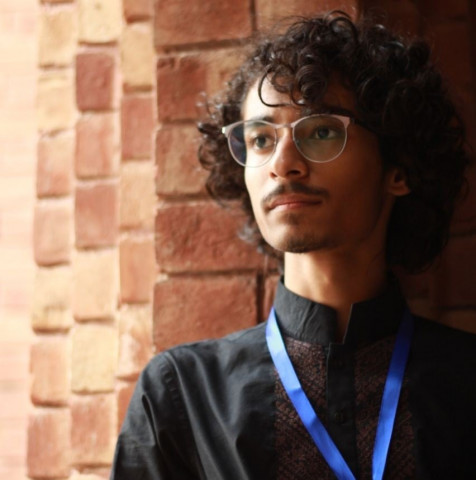Pakistanis ‘focus on stereotypical education instead of research’
At just 17, Shaheer Niazi has stunned scientists all over the world by re-examining the electric honeycomb phenomenon

PHOTO: EXPRESS
At only 17, the curly-haired boy has stunned scientists all over the world by re-examining the electric honeycomb phenomenon. The phenomenon gets its name from the honeycomb structure that appears on top of the surface of a thin layer of oil – a poor electricity conductor – when it is placed in an electric field, using one pointy and one flat electrode. The charged ions press on the surface of the oil instead of passing through, the resulting pressure creating the unique pattern.
It was not the phenomenon itself that got Niazi noticed, but in fact it was his innovative way of looking at it and recording it. Niazi was able to actually photograph the movements of the ions bombarding the surface of the oil, much like as he likes to describe it “… lightening hitting the surface of the earth.” He was also able to record the amount of heat generated at the surface of the oil, something no scientist in the world has ever done before.
17-year-old Pakistani student's physics paper surprises older scientist
Niazi was part of a team of four that went to attend the International Young Physicists' Tournament, held in Russia in 2016. His team was the first-ever to represent Pakistan. After making the breakthrough Niazi thought he should not let his research go to waste and get it published.
Exceptionally gifted, Niazi says he was always interested in the Sciences, and although his experiment was purely related to Physics, he takes avid interest in all the sciences including geology. He is a self-taught pianist who also sketches and paints in his spare time.
“My family has always helped hone my interests, no matter how unorthodox they may be,” said Niazi, adding that in Pakistan, most people believe that the only professions that exist are to do with medicine or engineering.
“My mother did, at one point, tell my sister to become a doctor, but when she was not interested. My mother did not pressure her, asking her to do what interests her,” he said, highlighting the interest-based learning at home.
“I was always curious and interested in learning more, so when I leaned towards research, my family, particularly my grandfather, helped me learn more,” he added.
The whiz kid is sad about Pakistan having limited funding for research and how there is no interest in the field as it is not focused upon.
“The only fields of education largely deemed worthy of pursuing are medicine and engineering, which makes it very difficult to obtain funding for research. If people realise that research is just as important, or even more as this is where innovation is achieved, perhaps there will be a higher possibility of obtaining funds,” he said.
Niazi, the youngest scientist to create waves in the world of physics of late, is currently in his first year of A levels, at the Lahore College of Arts and Sciences, but says that he will pursue higher studies abroad, at an institution geared towards research, such as Massachusetts Institute of Technology, Oxford or other ivy leagues.
When asked if he would like to study in Pakistan, he said if he does it will probably at a research oriented university, such as Lahore University of Management Sciences (LUMS).
“I conducted my research at LUMS, where the department head Dr Sabieh Anwar was extremely helpful, offering me full use of his physics lab, including sophisticated equipment,” he said.



















COMMENTS
Comments are moderated and generally will be posted if they are on-topic and not abusive.
For more information, please see our Comments FAQ